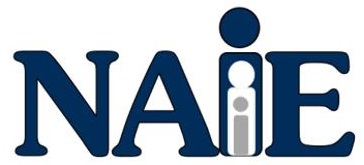The National Association of Interpreters in Education (NAIE) develops and promotes effective practices to empower current and future interpreters from varied backgrounds to meet the individual needs of the full spectrum of deaf* students in educational settings.
Vision Statement
The NAIE believes all deaf* students have the right to access the educational environment through professional interpreting services that best meet their individual needs. NAIE also believes an interpreter working in an educational setting must possess specialized academic and professional credentials that include knowledge and skill sets for working in diverse educational environments with the full spectrum of deaf* students. NAIE promotes a high standard of ethical practices, professional integrity, and the pursuit of excellence through professional development opportunities. Therefore, NAIE supports interpreters and advocates for appropriate standards to ensure interpreters have the qualifications necessary for the complex challenges of their work. NAIE values and respects an educational community where all have access to what they need to thrive and succeed. Therefore, NAIE celebrates and embraces a community that values its members and the unique perspectives, experiences, and culturally varied backgrounds of the deaf* students they serve.
Goals
Educate:
Provide continuing education and professional development opportunities that promote understanding and respect for different cultures, beliefs, and perspectives, acknowledging the importance of ensuring that everyone has access to a variety of opportunities and resources.
Inform the public about the contributions of the educational interpreting profession that include addressing systemic inequities and promoting social justice.
Advise educational administrators on best practices for educational interpreting services, including the need for specialized qualifications.
Build Connections:
Advocate for and support collaboration between members, professional groups, and other interested parties that work directly and indirectly with deaf* students to promote a culture of growth that empowers all individuals to contribute their unique strengths and perspectives in the decision-making processes.
Remove Barriers:
Identify and promote standards of practice within the field of educational interpreting that encourage the representation and participation of different groups of individuals regardless of age, race, religion, ethnicity, gender, sexual orientation, or disability.
Foster a sense of belonging by actively promoting an inclusive culture where all interpreters feel welcomed, respected, and heard.
*The NAIE recognizes and embraces the diversity of hearing levels, communication modalities, cultural, and other identities among students who utilize interpreters in educational settings. Within this organization, the term “deaf” has been utilized to collectively denote these students.
